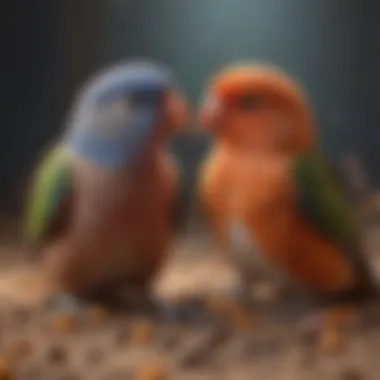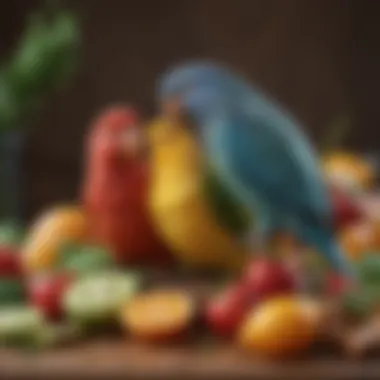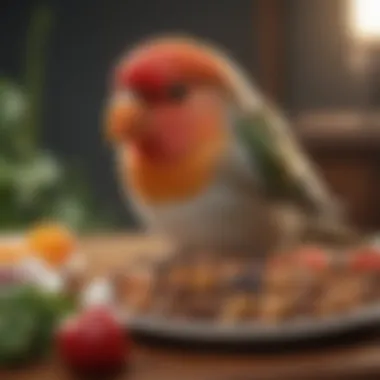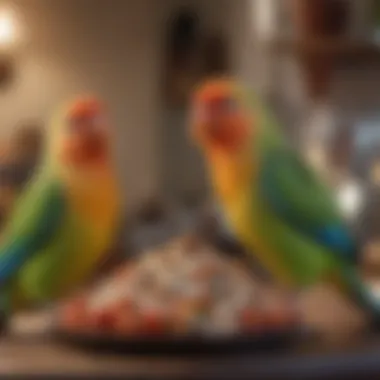Nutritional Needs of Love Birds: A Comprehensive Guide


Intro
Understanding the dietary needs of love birds is critical for their health and longevity. These small parrots are vibrant pets that thrive on a balanced diet. Their nutritional requirements are unique, shaped by their natural behaviors and habitats. A well-informed approach to their feeding habits dramatically affects their overall well-being.
In this guide, we explore essential information that pet owners should be aware of to ensure their love birds receive the best possible diet. We will cover the vital components of their food choices, potential nutritional deficiencies, and the significance of incorporating variety into their meals. Additionally, it's essential to consult with avian veterinarians for personalized guidance on feeding practices.
Understanding Your Pet
Love birds, like many other animal companions, are complex creatures with specific needs. By gaining insight into their behavior and natural documentation, owners can enhance their care and create a happier environment.
Pet Behavior Basics
Love birds are known for their social nature. They are active, curious, and exhibit playful behaviors. They often engage in activities such as preening, climbing, and interacting with toys or their human companions. Understanding these behaviors assists in creating a conducive environment that supports their mental and physical health.
Common Breed Characteristics
Love birds fall into various species, including the Peach-faced lovebird, Fischer's lovebird, and Masked lovebird. Each species displays distinct colors and sizes, but they share common behaviors. They generally require social interaction, mental stimulations, and a diet that supports their natural instincts and energy levels. Owners should research the specifics of the breed to provide tailored care.
Species-Specific Needs
The species of a love bird influences its dietary preferences. While they enjoy seeds, a balanced diet should also include pellets, fruits, and vegetables. Love birds originating from specific habitats might require additional supplements to meet their nutritional needs. For instance, those in the wild often consume various seeds and flora, indicating that dietary variety is paramount for their well-being.
Pet Care and Maintenance
Overall care is more than just feeding. A holistic approach encompasses grooming, hygiene and nutritional maintenance.
Feeding Guidelines
Providing the right balance of nutrients is important. Specific feeding guidelines can vary, but generally, a mix of seeds, pellets, fruits, and vegetables will meet their dietary needs. Aim for 60% to 70% pellets, supplemented with fresh foods. Always remove uneaten fresh produce to prevent spoilage.
Grooming Essentials
Grooming helps in maintaining the overall health of love birds. Regularly checking their nails and beak is essential. Instead of full grooming sessions, limit them to basic care like nail clipping and monitoring feather condition.
Hygiene Practices
Maintaining a clean living environment is vital. Regularly clean the cage, change the bedding, and provide fresh water. Hygiene plays a crucial role in preventing disease, which can significantly impact the health of love birds.
Health and Wellness
Regular health check-ups are necessary for early detection of potential problems.
Routine Vet Check-ups
Routine avian vet check-ups should be a priority. Schedule them annually or bi-annually, depending on your bird's health and age. Observing behaviors and changes in dietary habits can also provide insights into their health status.
Vaccination Needs
Loving care includes understanding vaccination needs. While not all love birds require vaccinations, consult an avian veterinarian to discuss the best protocols to follow in your area.
Recognizing Signs of Illness
Watch for changes in appetite, behavioral patterns, and energy levels. These can indicate underlying issues. Prompt veterinary attention can prevent serious health issues in love birds.
Enrichment and Activities
To promote well-being, love birds need both mental and physical stimulation.
Indoor vs.
Outdoor Activities
Indoor activities are often safer, yet outdoor experiences can provide new stimuli. If going outdoors, ensure safety from potential predators or hazards. Incorporate various activities indoors to keep your love bird engaged.
Interactive Toys and Games


Use toys that encourage foraging and problem-solving. Love birds benefit from mental challenges, which keep them active and entertained. Rotate toys to maintain their interest and introduce new elements to their environment.
Socialization Opportunities
Social interaction remains a crucial part of a love bird's happiness. Spend time with them, or consider another bird as a companion to ensure they remain happy and healthy. A well-socialized love bird is often more interactive and displays fewer signs of stress or anxiety.
Understanding these nuances of love bird care provides a foundation for nurturing their health and happiness. Through educated dietary choices and holistic care practices, pet owners can improve the quality of their love birds' lives.
Prelims to Love Birds
Understanding love birds is crucial for anyone considering them as pets. These small parrots are not just charming companions; they also require attention to their nutritional needs to thrive. In this section, we will explore their origin and habitat, as well as the various breeds available. This knowledge forms the foundation for making informed decisions regarding their care.
Origin and Habitat
Love birds originate from the African continent. They are primarily found in countries like Tanzania, Namibia, and Angola. These birds prefer low and mid-elevation habitats, often nesting in trees or shrubs. They thrive in environments where they can find a balance of seeds, fruits, and vegetation. Understanding their natural habitat aids in replicating a suitable living environment for them in captivity.
In the wild, love birds live in flocks, which influences their social behavior. They are known for forming strong pair bonds, a characteristic that is reflected in their name. By appreciating their origins, pet owners can better understand the need for social interaction among love birds. This understanding is essential when selecting a diet that supports their social needs and dietary requirements.
Love Birds Breeds
There are several breeds of love birds, each with distinct characteristics. Common breeds include the Peach-faced Lovebird, Fischer's Lovebird, and the Masked Lovebird. While the dietary requirements are similar across breeds, understanding specific needs and behaviors can help in providing tailored nutrition.
Peach-faced Lovebird: This breed is known for its vibrant colors and playful nature. They are often more social and might require a diet rich in variety to keep them stimulated.
Fischer's Lovebird: This breed tends to be slightly smaller and is recognized for its lively personality. A balanced diet enhancing good physical health will support their activity level.
Masked Lovebird: Distinguished by its unique markings, this breed requires careful attention to its dietary needs, especially in terms of vitamins and minerals.
Regardless of the breed, proper nutrition plays a vital role. Without it, pet love birds can face health issues. Therefore, pet owners should invest time in learning about the specific requirements for the breed they choose.
"A well-informed pet owner is vital for the health and happiness of love birds."
By exploring their origins and breeds, you can better appreciate the unique traits of love birds. This groundwork sets the stage for understanding their nutritional needs as we progress through the article.
Understanding Love Bird Nutrition
Understanding the nutritional needs of love birds is crucial for their overall health and well-being. Love birds, being small and active creatures, require a balanced diet that meets their specific needs. Proper nutrition can enhance their life span, promote vibrant plumage, and reduce the risk of diseases. Delving into their nutritional needs allows pet owners to make informed food choices that positively impact their feathered companions.
Digestive System of Love Birds
The digestive system of love birds plays a significant role in how they process their food. Love birds have a unique anatomy, including a gizzard that grinds seeds and a relatively short intestinal tract. This configuration enables them to obtain nutrition efficiently.
- Beak Functionality: Love birds possess strong, curved beaks adapted for cracking seeds and nuts. This natural design influences their food preferences and dietary habits.
- Gizzard Importance: The gizzard, located between the stomach and intestines, is vital for grinding down hard seeds. Providing love birds with grit is essential as it aids in this mechanical digestion process.
- Gut Flora Influence: A healthy balance of gut flora is also important. Probiotics can be beneficial in maintaining gut health.
Overall, understanding the digestive process helps pet owners choose foods that support the bird's natural functions.
Nutritional Requirements
The nutritional requirements of love birds depend on several factors such as age, size, and activity level. A balanced diet provides essential nutrients: proteins, carbohydrates, fats, vitamins, and minerals. Each contributes to different aspects of health.
- Proteins: Necessary for growth and feather development. Good sources include cooked beans, peas, and legumes.
- Carbohydrates: Provide energy. Whole grain blends are preferable.
- Fats: Healthy fats, like those from seeds, are important but should be given in moderation to avoid obesity.
- Vitamins: Vitamins A, D, and E play critical roles in skin health and visual function. Fresh fruits and vegetables are key sources.
- Minerals: Calcium is vital for bone health. Providing cuttlebone can aid in ensuring adequate calcium intake.
In summary, a diet that offers a variety of food choices can help meet the comprehensive nutritional needs of love birds. Using high-quality ingredients can enhance their health and well-being.
Types of Love Bird Food
Understanding the types of food that are suitable for love birds is essential for their overall health and well-being. Different food choices provide varied nutrients that influence their growth, energy levels, and longevity. A balanced diet is crucial as it supports their natural behaviors and functions. Selecting the right food can prevent malnutrition and help avoid common dietary problems. It is important for pet owners to grasp these concepts to foster a healthy environment for their love birds.
Pellets vs.
Seed Diets
Pellets and seed diets represent two primary options for love birds. Pellets are often recommended by veterinarians as they offer a more balanced and complete nutritional profile. They are formulated to provide all essential vitamins, minerals, and nutrients that love birds require.
Advantages of Pellets:
- Nutritional Balance: Pellets are designed to meet the dietary needs of love birds fully. They contain a blend of essential nutrients that might be lacking in a seed-based diet.
- Less Waste: Birds tend to waste seeds, whereas pellets leave behind less uneaten food.
- Reduction of Selective Eating: Love birds may prefer certain seeds over others, leading to imbalanced nutrition. Pellets prevent this by providing a uniform diet.


On the other hand, seed diets can be appealing because they are often more palatable. However, seeds alone may lead to nutritional deficiencies if they are not complemented with other food sources. They can also promote selective feeding habits.
Considerations for Seed Diets:
- Variety Needed: If seeds are chosen, they should be offered in moderation and mixed with other food types.
- Potential for Obesity: High-fat seeds can lead to weight gain if not monitored.
In summary, while seeds can be a part of a love bird's diet, pellets generally offer a more comprehensive nutrition solution that supports their health over the long term.
Fresh Fruits and Vegetables
Fruits and vegetables play a vital role in the diet of love birds, as they provide essential hydration and a variety of vitamins and minerals. Fresh produce should be included in their diet to enhance flavor and nutritional diversity.
Benefits of Fresh Produce:
- Hydration: Many fruits and veggies have a high water content, aiding in hydration.
- Rich Nutritional Profile: Items like carrots, spinach, and apples are rich in important vitamins. These nutrients promote better metabolism and overall health.
- Variety and Enjoyment: Offering different types encourages natural foraging behavior, keeping birds engaged and mentally stimulated.
Popular choices for love birds include brocolli, leafy greens, apples, and blueberries. It’s critical to wash all produce thoroughly to remove pesticides and chemicals. Certain items like avocado are toxic to birds and must be strictly avoided.
Commercial Treats and Supplements
Commercial treats and supplements can complement a love bird's diet when used properly. These products range from specialized pellets to nutritious snacks specifically designed for avian species.
Using these treats can make feeding more enjoyable and can also provide specific nutrients that may be lacking in regular diets. However, it is advisable to use them sparingly and not as a primary food source.
Points to Consider:
- Quality Matters: Always choose high-quality products without artificial additives or excessive sugars.
- Moderation Is Key: Treats are meant to be an occasional addition, not a replacement for their staple diet.
- Consult a Veterinarian: Always discuss with a vet before adding supplements to ensure they align with your love bird's specific needs.
Common Nutritional Deficiencies
Understanding common nutritional deficiencies is crucial for the overall health and well-being of love birds. These small, vibrant creatures require a balanced diet to thrive. When specific nutrients are lacking, it can lead to severe health issues. Addressing these deficiencies promptly ensures that love birds maintain their lively demeanor and health.
Vitamin Deficiencies
Vitamins play a vital role in love birds' health. They are necessary for metabolic functions, skin health, and immune system support. Here are some key vitamins that may be deficient in their diet:
- Vitamin A: This vitamin maintains good vision and strengthens the immune system. A deficiency can result in respiratory issues and skin problems.
- Vitamin D: This vitamin is essential for calcium absorption, promoting strong bones. Lack of Vitamin D can lead to weak bones and potential deformities.
- Vitamin E: Important for feather health and protecting cells from oxidative damage. Birds lacking this vitamin may experience poor feather quality and reproductive issues.
To prevent these deficiencies, ensure that love birds have access to fresh fruits and vegetables, such as carrots, sweet potatoes, and leafy greens, which are rich in essential vitamins.
Mineral Deficiencies
Minerals are equally significant. They contribute to numerous bodily functions, such as bone development and nerve function. Common mineral deficiencies that can affect love birds include:
- Calcium: Necessary for strong bones, calcium is vital. A lack of calcium can result in weakened bones and can hinder egg production in females.
- Phosphorus: This mineral supports bone health and is important for energy metabolism. An imbalance with calcium can disturb the overall health.
- Iron: Essential for oxygen transport and energy production. Deficiency might lead to lethargy and anemia.
Providing a mineral supplement or ensuring that their diet includes calcium-rich foods, like cuttlebone or mineral blocks, can help counteract these deficiencies.
Maintaining a balanced diet with adequate vitamins and minerals is paramount to prevent health issues in love birds. By prioritizing their nutritional needs, pet owners can ensure their birds lead vibrant and healthy lives.
Feeding Strategies for Love Birds
Feeding strategies for love birds play a critical role in ensuring their overall health and well-being. Love birds, like all pets, depend on their owners to provide proper nutrition. A well-rounded diet contributes not only to their physical health but also enhances their mental and emotional well-being. It is crucial to implement effective feeding strategies that take into account their unique nutritional requirements.
Understanding Portion Sizes
Portion sizes are one of the most vital aspects of feeding love birds. Offering the right amount of food prevents overfeeding and underfeeding, both of which can lead to health issues. Adult love birds typically require about one to two tablespoons of food per day, depending on their size and activity level. This quantity should be divided between their primary food source, whether pellets or seeds, and fresh fruits or vegetables.
Improper portion sizes can result in obesity or malnutrition. Too much food can lead to excessive weight, while too little can deny them essential nutrients. Pet owners need to observe their birds' eating habits closely. If food is consistently left uneaten, reduce the quantity offered. Conversely, if the birds appear to be hungry, slightly increase the portions. Regular weigh-ins can be a useful tool to monitor their health.
Maintaining a Varied Diet
A varied diet is essential for the well-being of love birds. Diversity in food sources ensures that they receive a wide range of nutrients. Love birds thrive on a mix of high-quality pellets, seeds, fresh fruits, and vegetables. By rotating their diet, owners can help prevent boredom. Providing meals that are as appealing as they are nutritious keeps love birds interested and happy.
Food Choices to Consider:
- Pellets: They are often formulated to meet the complete nutritional needs of love birds.
- Seeds: While tasty, a seed-only diet can lead to imbalances in nutrition if not supplemented properly.
- Fresh Fruits and Vegetables: These should comprise about 10-20% of their daily intake. Good options include leafy greens, carrots, and berries.
- Healthy Treats: Unsweetened dried fruits or small amounts of nuts can be offered occasionally.


Introducing new foods gradually is always a good strategy. This allows love birds to adapt their taste preferences without rejecting meals. As with portion sizes, keeping an eye on any dietary changes is vital. If any new food causes digestive issues, it is best to eliminate it from their diet.
Maintaining a balanced and varied diet is the key to a happy and healthy love bird.
This strategic approach to feeding will not only fulfill their nutritional needs but also promote a harmonious bond between birds and their owners. Understanding the specific feeding strategies will contribute significantly to their longevity and happiness.
The Role of Hydration
Proper hydration is vital for the health of love birds. Just like any other living creature, their body functions depend heavily on the availability of water, helping to regulate temperature, maintain electrolyte balance, and support every cellular process.
Importance of Fresh Water
Fresh water is an essential part of a love bird's diet. Ideally, it should be available at all times. Water assists in digestion and aids nutrient absorption, keeping their organs functioning efficiently. Without enough water, a love bird might experience dehydration, leading to serious health problems. It is recommended to change the water daily to prevent bacterial growth.
Always provide fresh water to your love bird; dirty water can lead to illness.
Pet owners should use a clean, shallow container that encourages the birds to drink freely. Observe the water level to ensure your pet is drinking regularly. Adjust the container size based on the number of birds and their drinking habits.
Electrolyte Considerations
Electrolytes are crucial for cellular function and fluid balance. They help in muscle contraction and nerve impulse transmission. Love birds need a balance of electrolytes to function optimally.
If food choices are lacking in certain nutrients, it may be necessary to supplement their water with electrolyte solutions specially designed for birds. Birds under stress or those that are ill may require additional electrolytes to prevent complications.
Here are a few key points to consider regarding electrolytes:
- Observe your love bird for signs of dehydration like lethargy or decreased activity.
- Seek out recommended electrolyte solutions from avian veterinarians.
- Reduce stress factors in their environment, as stress can lead to imbalances in hydration and electrolytes.
By focusing on hydration and its benefits, love bird owners can greatly enhance the overall well-being of their pets.
Health Monitoring Through Diet
Monitoring a love bird's health through its diet is essential, as nutrition directly influences overall well-being. A careful approach to dietary choices can help identify underlying health issues before they escalate. Pet owners should observe their birds consistently, noting behavioral changes that may signal dietary concerns.
The relationship between diet and health is profound. Proper nutrition not only satisfies basic needs but also fosters a strong immune system, promotes healthy feathers, and ensures better longevity. The importance of a balanced diet is clear, but it must also be coupled with regular observations for shifts in health status.
Signs of a Healthy Diet
Several indicators show that a love bird is receiving a healthy diet. Owners should consider the following aspects:
- Vibrant feathers: Shiny and well-maintained plumage suggests proper nutrition.
- Energy Levels: Active and playful birds typically signal a balanced diet.
- Normal Droppings: The color and consistency of droppings can indicate health; they should be consistent and lack abnormalities.
- Weight Stability: A consistent weight, within a healthy range, often reflects adequate dietary intake.
A well-fed love bird exhibits signs of vitality, suggesting that the chosen diet is supporting its health.
While these signs are helpful, they do not cover all possibilities. Variations in diet and genetic factors can lead to differing health conditions among birds. Thus, understanding individual needs remains crucial.
When to Consult a Veterinarian
Even with the best diet, certain signs indicate that professional help is necessary. Pet owners must closely watch for:
- Sudden Weight Loss or Gain: This shift may indicate a health problem.
- Lethargy or Decreased Activity: A lack of energy can be a red flag.
- Changes in Eating Habits: If the bird suddenly refuses to eat or drink, it could signal illness.
- Feather Loss or Poor Feather Quality: This suggests nutritional deficiencies or illness.
- Digestive Issues: Diarrhea, vomiting, or unusual droppings often require veterinary attention.
Regular check-ups and open communication with veterinarians lend to better long-term health outcomes. Prompt action can prevent severe issues from developing. As love birds depend entirely on their owners for health and nutrition, taking proactive measures can ensure their continued happiness and wellbeing.
Epilogue
In this article, the examination of love birds' nutritional needs plays a crucial role in ensuring their overall health and happiness. Understanding their dietary requirements leads to better food choices for pet owners. This knowledge helps avoid common mistakes that can result in serious health issues.
Summarizing Dietary Best Practices
To recap the best dietary practices for love birds, it is essential to provide a balanced diet that includes high-quality pellets, fresh fruits, and vegetables. A mix of seeds can be included but should not dominate their diet. Here are key pointers:
- High-Quality Pellets: Select pellets designed specifically for love birds; these provide vital nutrients.
- Fresh Produce: Rotate a variety of fruits and vegetables. Options like spinach, carrots, and apples can be good choices.
- Seeds: While seeds should not be the main component, they can be offered in moderation as a treat.
- Hydration: Always ensure fresh water is available and clean.
- Monitoring Portions: Pay attention to portion sizes to prevent overfeeding and obesity.
A balanced diet is crucial for maintaining the overall wellbeing of love birds.
Regular monitoring and observation of eating habits and preferences are also critical to ensure they are receiving the right nutrients. Consulting with an avian veterinarian can further elevate the quality of care provided.
Long-term Health Considerations
Long-term health for love birds is greatly influenced by their diet. Proper nutrition not only supports physical health but also contributes to mental wellness. Here are several considerations:
- Prevention of Health Issues: A well-balanced diet can prevent nutritional deficiencies and associated diseases, promoting a longer lifespan.
- Weight Management: Correct portion sizes and a mix of foods encourage a healthy weight, reducing the risk of obesity-related conditions.
- Behavioral Benefits: Nutrition impacts behavior. A bird lacking essential nutrients might display erratic behavior, which can be mitigated with proper feeding.
- Routine Veterinary Check-ups: Regular visits to an avian vet allow for timely adjustments in diet based on recent health assessments.







